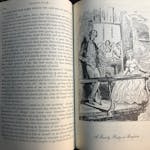We once were nomads, Norwegian journalist Torbjørn Ekelund writes, but nowadays "we live our lives sitting down."
This changed for him a few years ago when he was diagnosed with epilepsy and lost his driving privileges. He began to walk everywhere. Two miles to work, four miles to the grocery store — he shoulders his backpack (which now feels like a part of him) and trudges off.
Walking proved liberating, Ekelund writes in his thoughtful memoir, "In Praise of Paths." "My pace of life slowed, my pulse decreased, and the world opened up to me in a way I had not experienced since I was a child."
Walking gave him a different concept of time and a different understanding of place. It enabled him to "look around and take the world in, to observe the shift that comes with slowing down, to hear sounds, recognize smells, feel the wind, sun and rain."
Like a hillwalker on a ramble, this book meanders pleasantly. Ekelund experiments with walking barefoot, walking with his eyes closed, following ancient paths, and following no path. He notes the subtle differences between walking and ambling, strolling or sauntering. He writes about how much he dislikes running. While walking always triggers a flood of thoughts, "When I run, I don't have any good ideas," he says. "I can hardly think about anything other than … when I can finally stop." (I'm with him there.)
His appreciation of walking leads to an examination of the places he walks — footpaths and hiking trails and sidewalks and roads. Of most interest to him are wilderness paths. They exist because they are used, he says, and if they are no longer used, nature simply erases them.
"Paths were the first main thoroughfares, and the way in which they meander and wind through the landscape tells us something very fundamental," he writes. A path "is not the shortest distance between two points; it is the simplest."
The path of his heart — and at the heart of this book — is the path he first trod as a child, the meadow path at his grandparents' farm outside of Oslo, where his father used to urge him, "Come on. Get off the sofa. A little bit of movement is good for everyone."
Ekelund's writing — deftly translated from the Norwegian by Becky L. Crook — is direct and clear, sprinkled with vivid metaphors. (When he plunges into the woods to forge his own path, the forest "shut like a zipper" behind him. Squirrel tracks are "a trail of cones sprinkled across the snow like cinnamon on rice pudding.")
I am an inveterate walker myself, as was my father. As Ekelund points out, walking clears the mind, refreshes the body and stimulates the senses. I used to backpack, I now do long-distance hiking and I trudge daily through my neighborhood park with my dog. I am not interested in walking four urban miles to the grocery store, but, like Ekelund — and like so many people — I find remote roads and paths nearly irresistible as they curve through the forest.
What is around that bend? Where will this trail take me?
Ekelund writes, "I walk long distances, but I always wish I could keep going. I would love to leave everything behind me and just walk, day after day, for thousands of miles, on paths I've never taken before."
This lovely book taps into something primeval in us all.
Laurie Hertzel is the senior editor for books at the Star Tribune and president of the National Book Critics Circle. • 612-673-7302 facebook.com/startribunebooks
In Praise of Paths: Walking Through Time and Nature
By: Torbjorn Ekelund, translated from Norwegian by Becky L. Crook.
Publisher: Greystone Books, 230 pages, $24.95.





